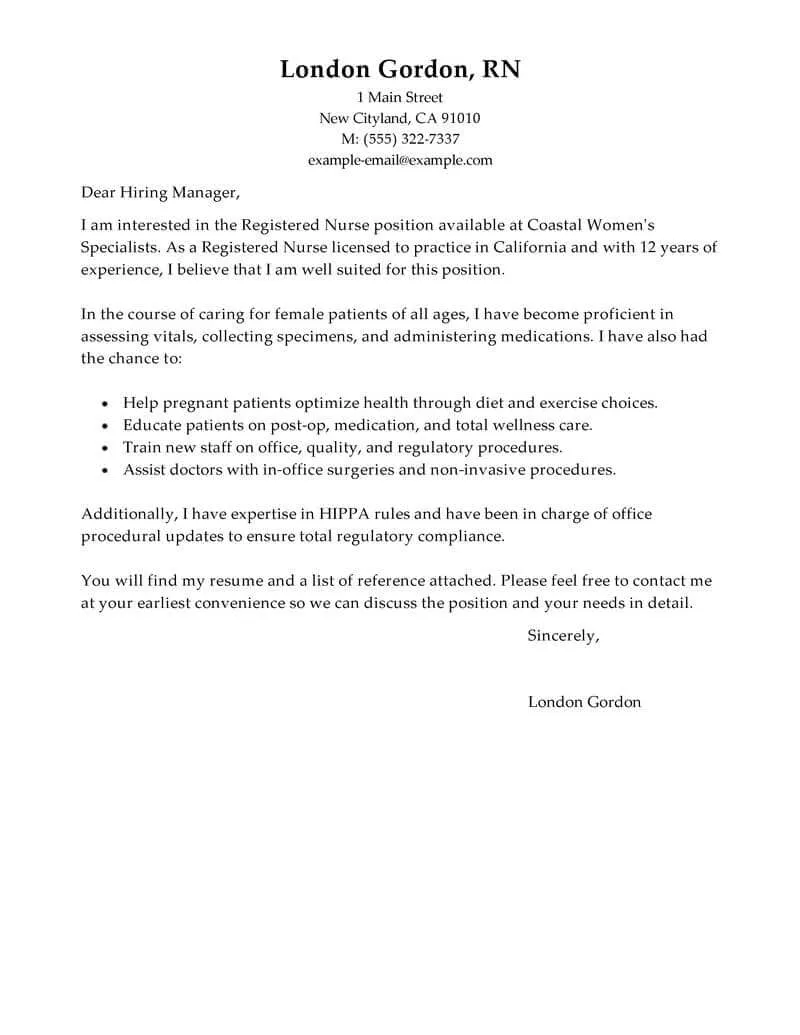What is a Nursing Cover Letter
A nursing cover letter is a crucial document that accompanies your nursing resume when applying for a job. It serves as your introduction to a potential employer and provides an opportunity to highlight your qualifications, skills, and experiences. Unlike a resume, which is a concise summary, a cover letter allows you to elaborate on your achievements, explain your career goals, and demonstrate your enthusiasm for the specific position and the healthcare organization. It’s a chance to make a strong first impression and persuade the hiring manager to invite you for an interview. Therefore, crafting a compelling cover letter is essential for any nurse seeking to advance their career.
Why a Nursing Cover Letter Matters
In the competitive field of nursing, a well-written cover letter can significantly improve your chances of landing your dream job. It provides context to your resume, allowing you to showcase your personality, communication skills, and passion for nursing. The cover letter is your chance to make a great first impression and demonstrate your genuine interest in the position. It also allows you to address any potential gaps in your experience, such as career changes or extended periods of unemployment. Furthermore, the cover letter demonstrates your writing and organizational skills, which are vital in the nursing profession. By taking the time to create a customized cover letter for each application, you are positioning yourself as a serious and dedicated candidate.
Highlighting Your Skills and Experience
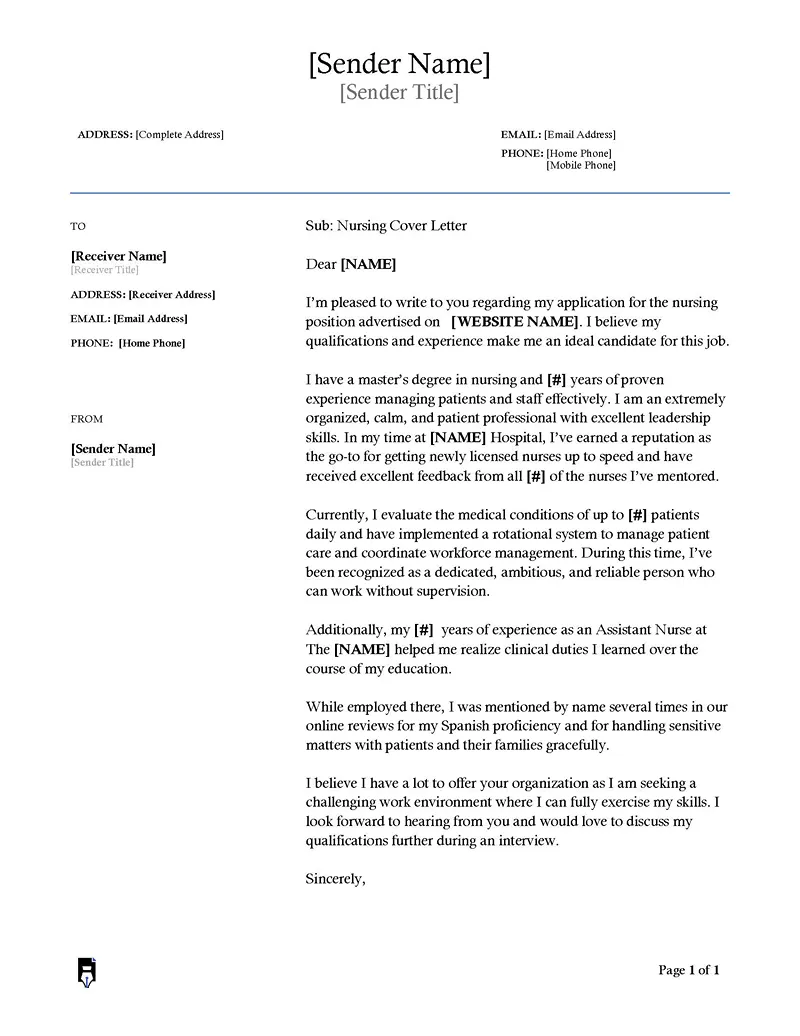
Your nursing cover letter should effectively showcase your relevant skills and experiences. Begin by identifying the key requirements outlined in the job description and then tailor your cover letter to address them directly. Provide specific examples of your accomplishments, using the STAR method (Situation, Task, Action, Result) to illustrate your contributions and the positive impact you made in previous roles. Quantify your achievements whenever possible; for example, mention the number of patients you cared for or the percentage improvement in patient outcomes you achieved. Highlight any specialized certifications or training you possess, such as advanced cardiac life support (ACLS) or critical care nursing (CCRN), as these can significantly enhance your candidacy.
Tailoring Your Letter to the Job
One of the most critical aspects of writing an effective nursing cover letter is tailoring it to the specific job you’re applying for. This means carefully reviewing the job description and identifying the key skills, experiences, and qualifications the employer is seeking. Use this information to customize your cover letter, highlighting the aspects of your background that align with the requirements. Avoid using a generic cover letter and instead, demonstrate that you’ve taken the time to understand the role and the organization. Research the healthcare facility and mention specific initiatives or values that resonate with you, showing your genuine interest in joining their team.
Researching the Employer
Before writing your cover letter, take the time to research the healthcare organization or facility. Visit their website, read about their mission and values, and learn about their current initiatives. This research will enable you to personalize your cover letter and demonstrate your genuine interest in the organization. Mention specific aspects of their mission, patient care approach, or community involvement that appeal to you. Referencing the employer’s values and demonstrating your understanding of their goals will show the hiring manager that you are a serious candidate who is a good fit for their team. This also allows you to address your career goals and how they align with the mission of the hospital or healthcare facility.
Showcasing Relevant Skills
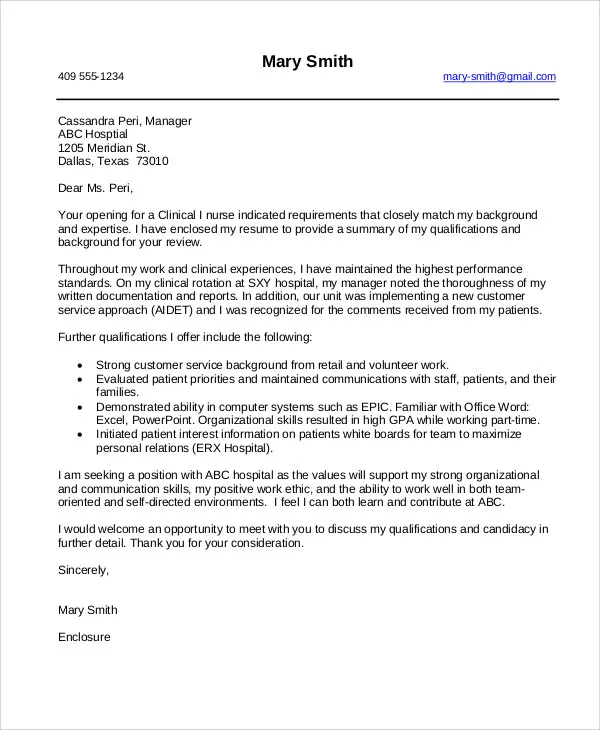
In your nursing cover letter, clearly showcase your relevant skills. Identify the skills most important to the job and provide concrete examples of how you’ve utilized them in your previous roles. For example, if the job description emphasizes communication skills, describe a situation where you effectively communicated with a patient or their family to address their concerns or explain a complex medical procedure. Demonstrate your ability to work collaboratively as part of a healthcare team. Highlighting your technical skills, such as your proficiency with electronic health records (EHR) systems or specific medical equipment, can further strengthen your application. Remember to emphasize your soft skills as well, such as empathy, critical thinking, and problem-solving abilities. Your cover letter is an excellent opportunity to display leadership and teamwork.
Quantifying Your Achievements
Whenever possible, quantify your achievements in your nursing cover letter. Use numbers and data to demonstrate the impact you’ve made in your previous roles. For example, instead of simply stating that you improved patient satisfaction, mention the percentage increase in patient satisfaction scores you achieved. If you implemented a new protocol or process, quantify the results, such as the reduction in medication errors or the decrease in patient readmission rates. Using data and metrics makes your accomplishments more tangible and persuasive, showing the employer the value you bring to the table. This approach allows you to set yourself apart from other candidates by showcasing a proven track record of success.
Formatting Your Nursing Cover Letter
The format of your nursing cover letter is as important as its content. A well-formatted letter is easier to read and conveys professionalism. Use a standard business letter format, including your contact information, the date, the employer’s contact information, and a formal salutation. Maintain a clean and clear layout with ample white space, using a readable font such as Arial or Times New Roman. Keep the letter concise, typically no more than one page. The structure of your letter should consist of an opening paragraph, several middle paragraphs, and a closing paragraph. Each paragraph should be well-organized, with clear topic sentences and supporting details. Carefully proofread your letter to ensure there are no grammatical errors or typos.
Contact Information and Salutation
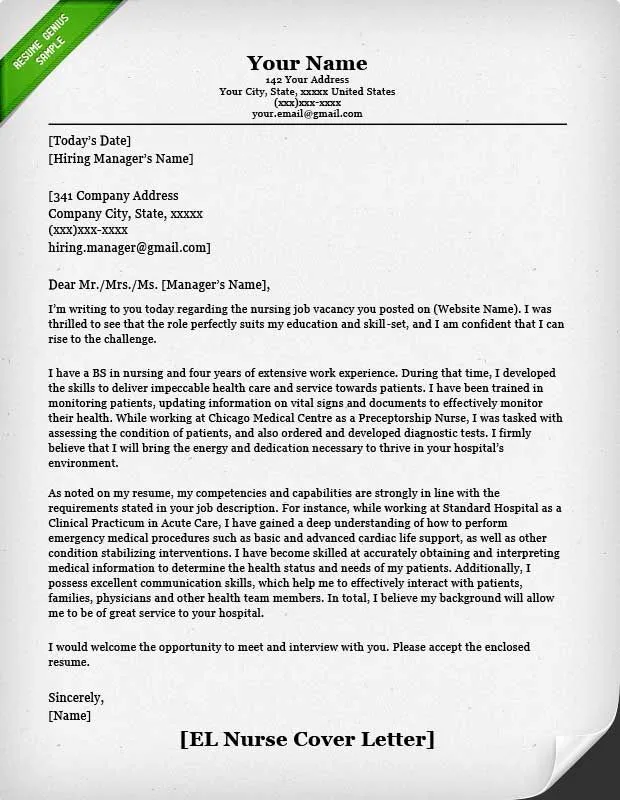
Begin your cover letter by including your contact information at the top. This should include your full name, phone number, email address, and LinkedIn profile (optional). Following this, include the date and the employer’s contact information, including the hiring manager’s name and title, if known. Always address the hiring manager by name whenever possible; if you are unsure, you can research this information or use a general salutation such as “Dear Hiring Manager.” Avoid using overly casual greetings. Using the correct salutation shows that you are detail-oriented and respect the reader’s time.
Body Paragraph Structure
The body of your nursing cover letter should be well-structured and divided into several paragraphs. Each paragraph should focus on a specific aspect of your qualifications and experiences. Use clear and concise language, avoiding jargon and technical terms that the reader may not understand. Organize your thoughts logically, starting with your opening paragraph, which should state your purpose and highlight your key qualifications. Follow this with several middle paragraphs that elaborate on your skills, experiences, and accomplishments, providing specific examples and quantifiable results. Conclude with a closing paragraph that reiterates your interest in the position and expresses your gratitude for the opportunity.
Opening Paragraph
Your opening paragraph should immediately grab the reader’s attention and clearly state your purpose for writing the letter. Mention the specific position you’re applying for and where you saw the job posting. Briefly introduce yourself, highlighting your key qualifications and skills relevant to the role. State your enthusiasm for the position and the healthcare organization. Your opening paragraph is a great opportunity to make a strong first impression. Consider including a compelling statement about your passion for nursing or a brief summary of your most relevant experience. Keep the opening paragraph concise, aiming for no more than four sentences, to maintain the reader’s interest and create a positive impression.
Middle Paragraphs
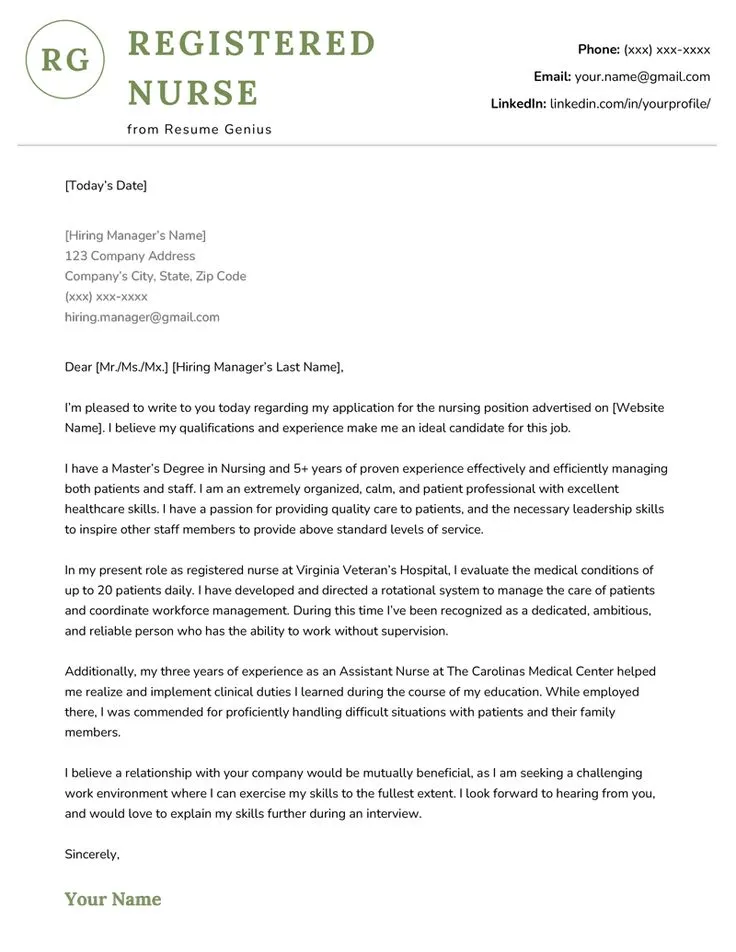
The middle paragraphs of your cover letter are where you provide detailed information about your skills, experience, and accomplishments. Use the job description as a guide, addressing each of the key requirements and providing specific examples of how you have met those requirements in previous roles. Utilize the STAR method to structure your responses, providing context and explaining your achievements. Focus on the skills and experiences that are most relevant to the position. Include examples that showcase your ability to work in a team, communicate effectively, and provide patient-centered care. Use this space to demonstrate your knowledge and expertise. Be as specific and detailed as possible, providing evidence to support your claims.
Closing Paragraph
Your closing paragraph should reiterate your interest in the position and express your gratitude for the opportunity. Reiterate your key qualifications and why you are a good fit for the role. Thank the hiring manager for their time and consideration. Include a call to action, such as stating that you are eager to discuss your qualifications further and are available for an interview. Provide your contact information again, making it easy for the hiring manager to reach you. The closing paragraph is your final chance to leave a positive impression. Make sure it is concise, professional, and expresses your enthusiasm for the opportunity.
Proofreading and Editing Your Letter
Before submitting your nursing cover letter, proofreading and editing are crucial steps. Ensure your letter is free of any grammatical errors, typos, and spelling mistakes. These errors can undermine your credibility and make a negative impression on the hiring manager. Read your letter aloud to catch any awkward phrasing or sentence structures. Ask a trusted friend, colleague, or career counselor to review your letter for feedback. They may be able to identify any areas for improvement that you have missed. Pay close attention to the overall tone and ensure it is professional and enthusiastic. Double-check the formatting to ensure it is consistent and visually appealing. Make sure you are sending a high-quality document that represents you positively.
Using Action Verbs
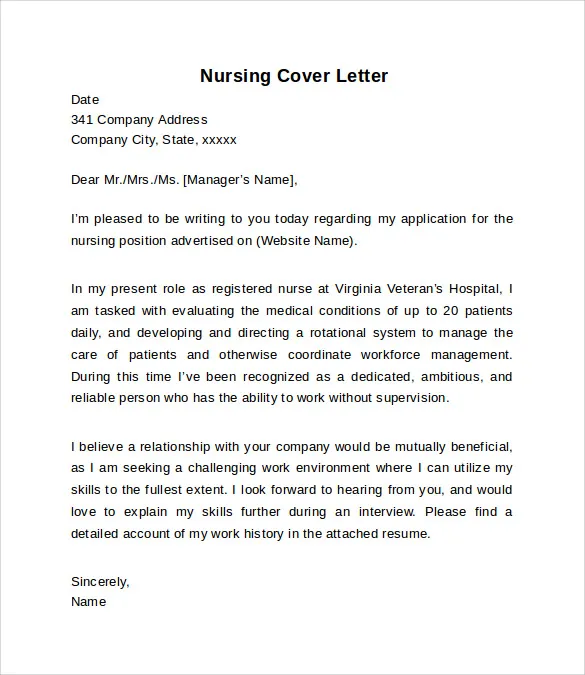
Enhance your cover letter by using strong action verbs to describe your skills and accomplishments. Action verbs make your writing more dynamic and engaging, helping you highlight your contributions and achievements. Instead of using passive phrases like “was responsible for,” use active verbs like “managed,” “implemented,” or “achieved.” Examples include: managed patient care, implemented new protocols, achieved a 15% reduction in medication errors, and collaborated with a multidisciplinary team. These words convey your skills and experience with more impact. Using strong action verbs makes it easier for the hiring manager to see the value you would bring to their organization. The right action verbs also add clarity and increase readability.
Ensuring Professionalism
Maintaining professionalism throughout your nursing cover letter is essential. Use a professional tone and avoid slang, jargon, or overly casual language. Ensure your letter is well-organized and easy to read, with a clear and logical flow. Use proper grammar and punctuation. Pay attention to the formatting, using a standard business letter format with appropriate spacing and margins. Be respectful in your tone, even if you have concerns or disagreements. Make sure your contact information is accurate and up-to-date. Remember that your cover letter is a reflection of your professional image and attention to detail, so it should be polished and error-free. Showing professionalism makes you a more attractive candidate.
Examples of a Nursing Cover Letter for Resume
Reviewing example nursing cover letters can provide valuable insights and guidance when writing your own. Look for examples tailored to different nursing specializations, such as critical care, pediatrics, or surgical nursing. Pay attention to the structure, formatting, and language used in the examples. See how other nurses have highlighted their skills, experiences, and achievements. Use these examples as a starting point, adapting them to your unique background and qualifications. Ensure you personalize your cover letter and avoid simply copying and pasting from the example. By studying examples, you can learn from successful applications and improve your ability to create a compelling cover letter. Also, adapt the examples to meet your requirements.
